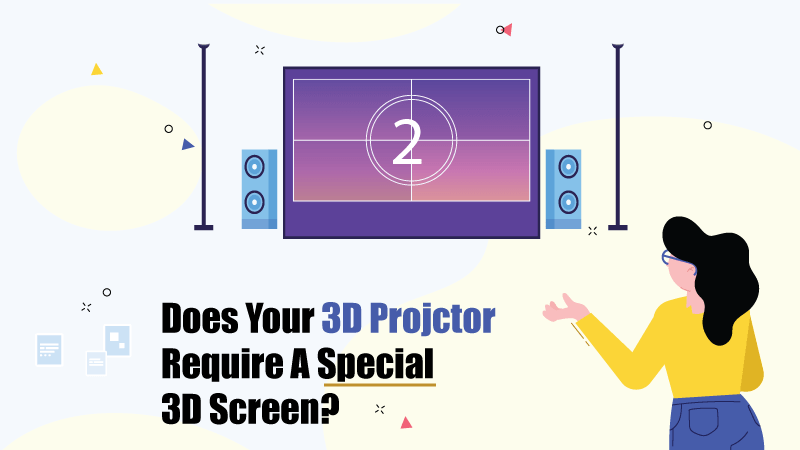Did you think purchasing a dedicated screen with a 3D projector was essential? Hold on to the simple explanation of the myth.

Who wouldn’t want to unwind at home on a lazy Sunday while watching their favorite shows? Technology has helped increase the popularity of 3D projectors throughout time.
Many people are still hesitant to buy these projectors despite their rising popularity because of their limited budgets and the misconception that a specific screen must be purchased to use a 3D projector.
If you are debating whether to buy a specific screen for a 3D projector, this article is for you.
You’ll learn when you specifically require a personalized screen and when you don’t.
Does your 3D projector require a special screen?
The genuine answer to this question is that it’s not always necessary. However, if you value visual quality highly, you should purchase it.
A customized screen with high gain is preferable to a standard screen for viewing 3D content. Because light will be reflected in a particular direction, the images on these screens will appear brighter.
When is it possible to forgo such a screen?
Let me ask when you and your family first watched a 3D movie together. Do you still recall being given the odd-looking, thick-lens spectacles as you walked into the hallway?
You thought, “I could have never experienced this at home,” after seeing the movie, didn’t you?
The good news is that these projectors allow us to construct home theatres today easily. No more setup is required, either.
You can access these projectors in various formats, such as top-and-bottom 3D signals, side-by-side 3D signals, and frame packing.
The visuals transmitted through 3D signals can be viewed with both eyes open if you wear 3D glasses.
To watch the shows in this instance, no particular screens are needed.
Compared to dedicated screens, these glasses are inexpensive and easy to obtain online and offline. A big investment is therefore not required.
When do you need a special screen for your projector? What circumstances call for the deployment of special screens?
The restriction that only specific displays are compatible with 3D viewing has a few exceptions.
For the optimum viewing experience, you might need a specific polarisation screen with two 3D projectors installed. There are two lenses on each of these projectors.
The same viewing experience cannot be achieved with glasses as with a dedicated screen. You could still require glasses if you want to tell which option. But those who prefer to forgo their screens typically spend their money on 3D active glasses.
All set and done; you should know that specific screens are only required for these projectors if you want to enjoy watching shows on dual 3D projectors.
Now comes the question: do you still require a special screen even if you have 3D glasses?
Consider the price of the 3D glasses and 3D projector you currently own. It is not essential to use an expensive specialized screen. You can only use the glasses to view your stuff.
However, it is much preferable to have panels that reflect ambient light at a high gain because this makes the pictures brighter, as opposed to 3D graphics, which occasionally tend to become darker. The range of formats in which projectors are offered is a significant factor in the darker images.
Nevertheless, you should know that specific screens are only required for these projectors if you want to enjoy watching films on twin 3D projectors.
Things to consider when buying special screens for your 3D projectors
I assume you’ve already decided whether to buy a specialized projector screen.
Below are a few considerations to make if you purchase a special screen.
You must consider four factors when looking for the ideal screen. These are- the dimensions, aspect ratio, and mode of the screen and its material.
The Material: What material is the special screen?
Special screens come in various colors: white, black, grey, and silver. Knowing which performs best is essential to select the ideal screen material.
When selecting the screen material, bear the following ideas in mind.
White screen: A white screen is best if you set the screen in a space with minimal ambient lighting. The sharpness of the image displayed on a white screen will be affected by the ambient light in your environment. The clarity of the photos will decrease as the room becomes lighter.
Silver & Black screens: Contrarily, silver, black, or grey screens can efficiently filter out extra light. Therefore, you don’t have to reduce ambient light to get clear photographs.
Screen Gain: A low-gain screen is suggested if you plan to install it in a dimly lit area because it improves the clarity of the visuals. However, if you select a screen with high gain, you will see that the image has sharp edges and dark ones in the middle. You can read here about what screen gain is in detail.
Size: What size of the screen is essential?
The screen’s alignment with the size of the image is the second most crucial factor to consider when purchasing a particular screen. The best way to determine this is to get a screen accommodating your projector’s maximum supported image size.
In addition, remember to measure the room’s dimensions before placing the screen there. The size of the wall where the screen would be placed, the throw distance, and the ceiling height are all equally important.
Aspect Ratio: Does Aspect Ratio matter?
The third most crucial factor in a screen purchase is the aspect ratio. If you aren’t familiar with aspect ratios, select a 16 x 9 or a 2:4:1 aspect ratio.
Remember that the former is best for enjoying games, sports, and television. Choose 2:4:1 if you love films as much as I do.
Mode of the screen
Special screens for projectors are either fixed or retractable. If you have a designated place for your screen and do not wish to move it until you decide to relocate to a different house, you can choose to buy a fixed special screen.
Similarly, buying a retractable screen is best if you hate monotony and wish to use the screen in another room.
These screens are extremely attractive and can be used in multiple rooms. The best thing about these screens is that they remain flat even after they are extended.
Conclusion: So, does your 3D projector require any special screen?
If you are not using dual 3D projectors and have 3D glasses on you, you do not need to utilize special screens because only these projectors have two lenses that can be viewed clearly with a proper screen.
The glasses function with other 3D projectors without a problem. Be sure to collect space measurements, consider how you intend to use the screen because it will influence the aspect ratio and mode, and make an informed decision regarding the screen’s material.
Bearing these things in mind will make it simple for you to select a good screen for your 3D projector.
Outline of the Article
1. Introduction
- 1.1 Overview of 3D Projectors
- 1.2 Common Misconceptions
2. Do 3D Projectors Require a Special Screen?
- 2.1 Debunking the Myth
- 2.2 Factors Influencing the Need for a Special Screen
- 2.3 Visual Quality and the Role of a Personalized Screen
3. When Can You Forgo a Special Screen?
- 3.1 Evolution of Home Theaters
- 3.2 3D Projector Formats and Glasses
- 3.3 Instances Where Special Screens Are Not Necessary
4. When Do You Need a Special Screen for Your Projector?
- 4.1 Exceptions and Compatibility Issues
- 4.2 Dual 3D Projectors and Special Polarization Screens
5. Considerations for Buying Special Screens
- 5.1 Material of the Special Screen
- 5.1.1 White Screens
- 5.1.2 Silver, Black, or Grey Screens
- 5.2 Size of the Screen
- 5.2.1 Alignment with Image Size
- 5.2.2 Room Dimensions
- 5.3 Aspect Ratio
- 5.3.1 16 x 9 Aspect Ratio
- 5.3.2 2:4:1 Aspect Ratio
- 5.4 Mode of the Screen
- 5.4.1 Fixed Screens
- 5.4.2 Retractable Screens
6. Conclusion
- 6.1 Recap of Screen Necessity
- 6.2 Considerations for Making an Informed Decision
Related Articles:

